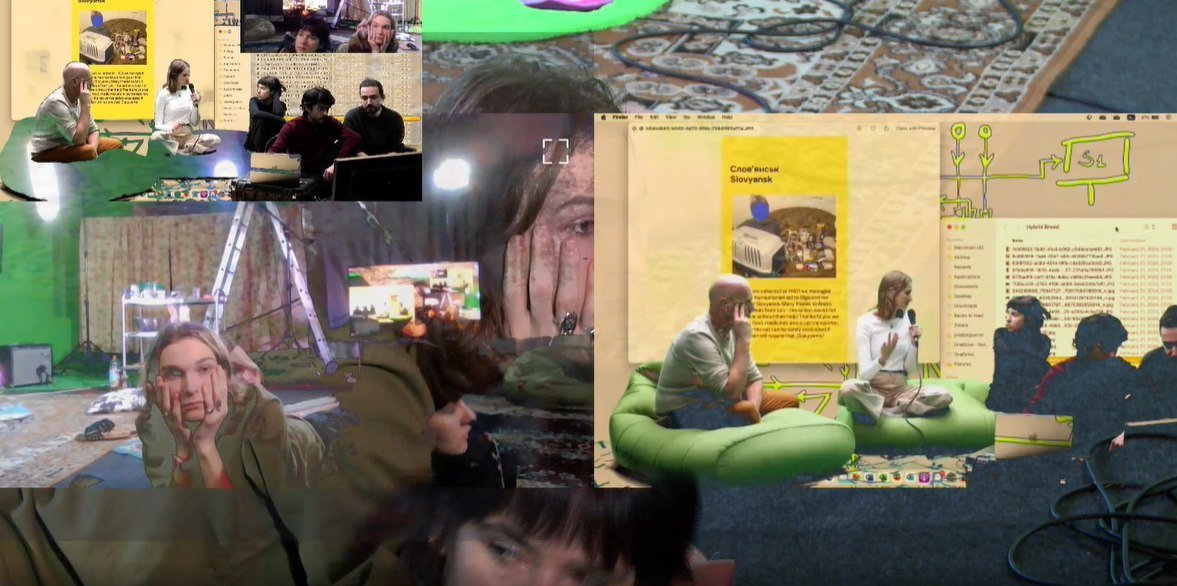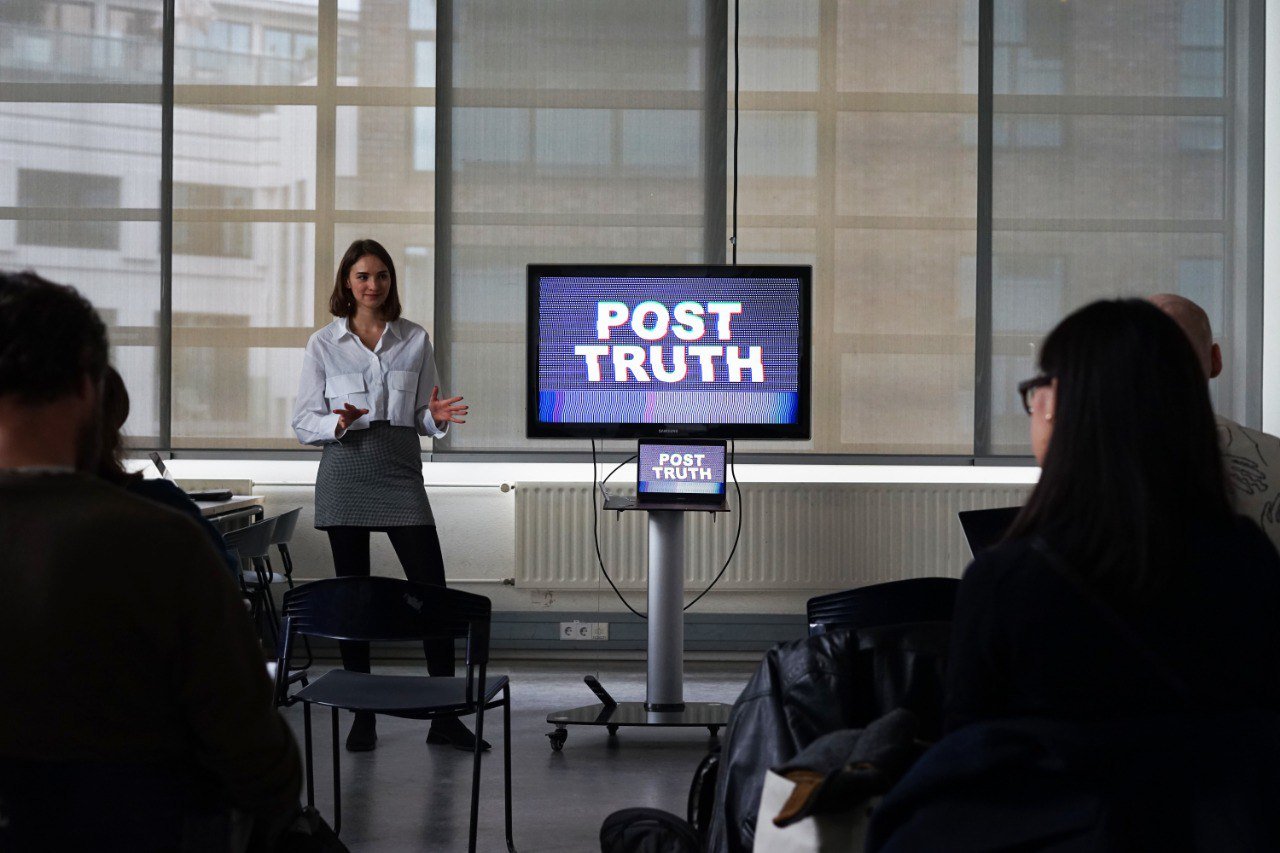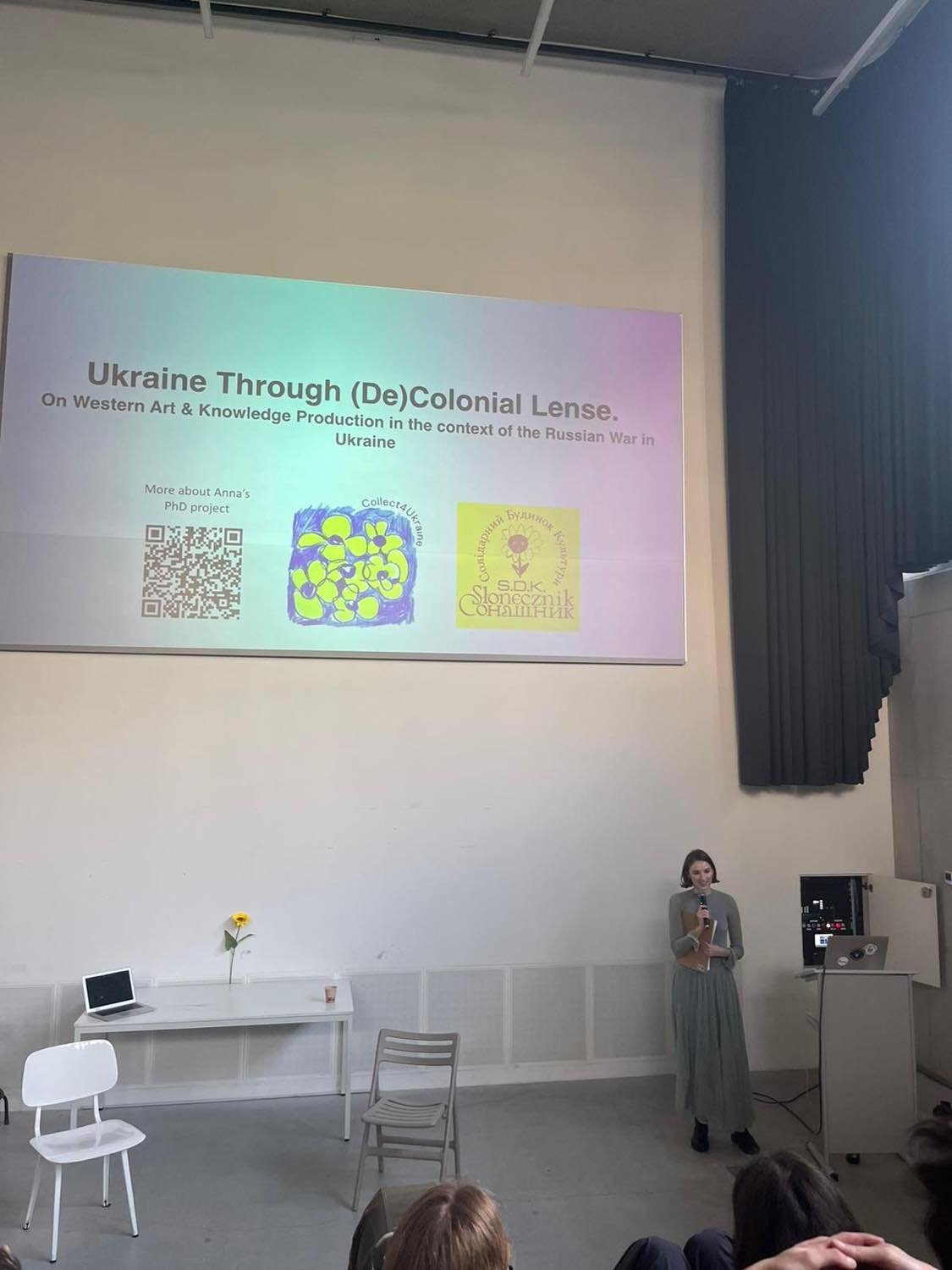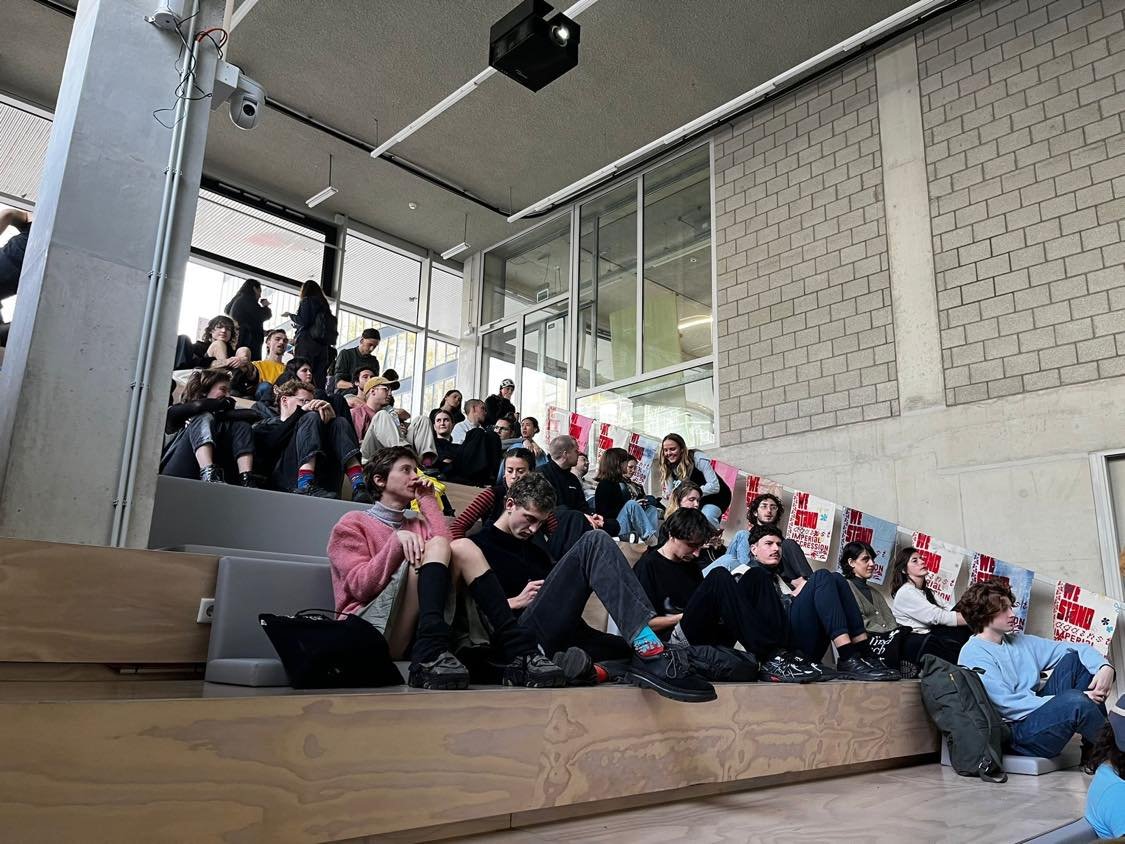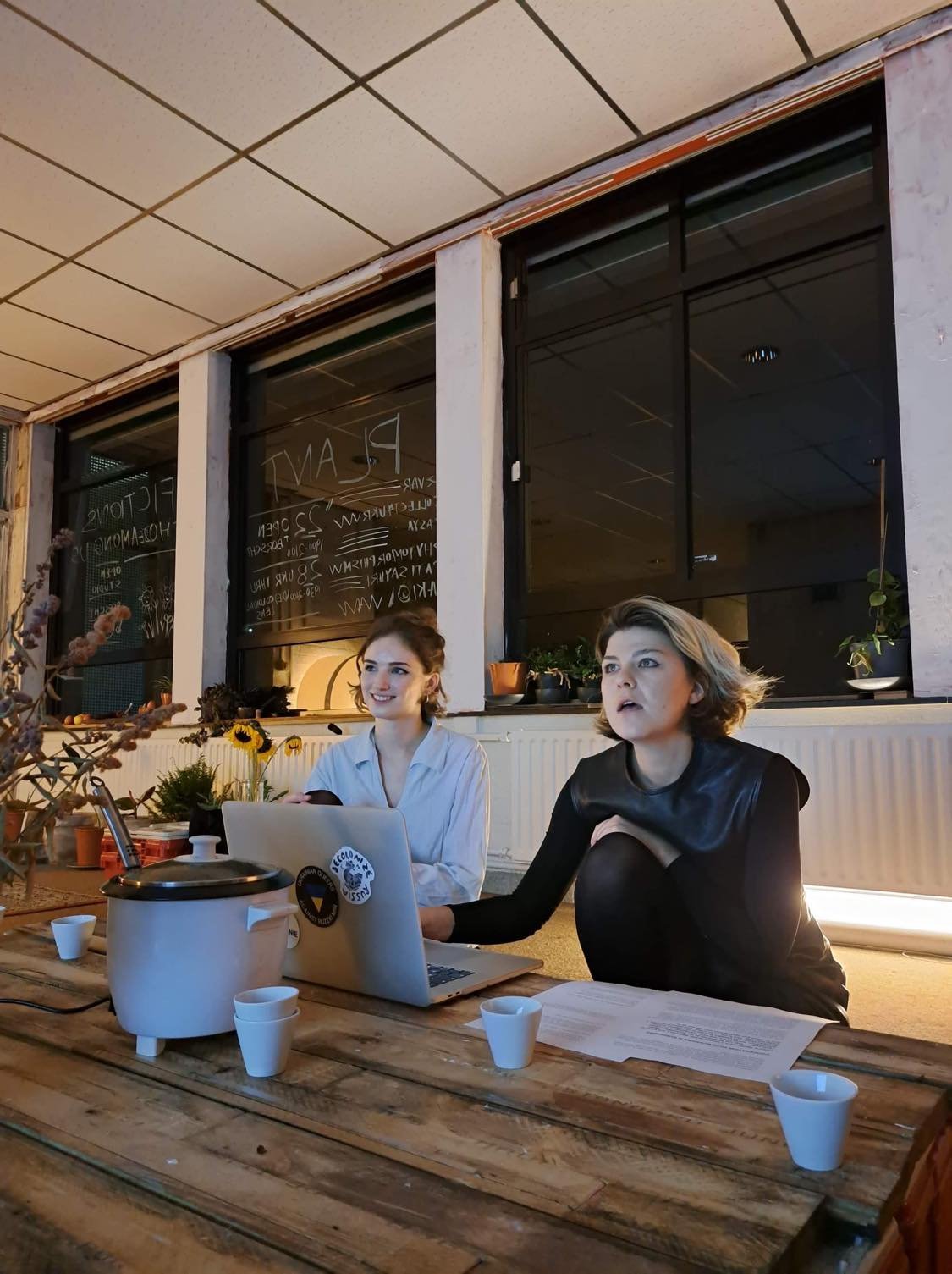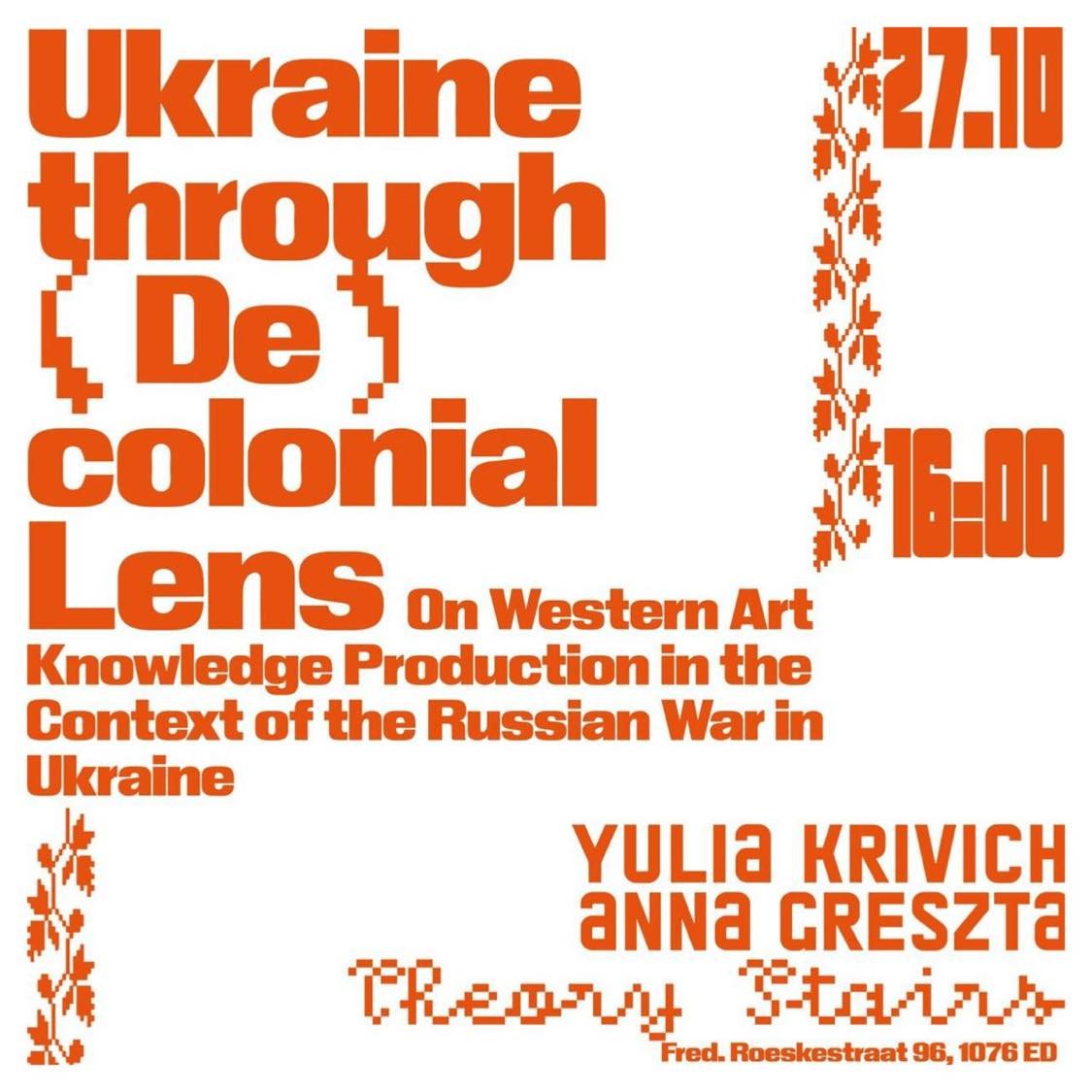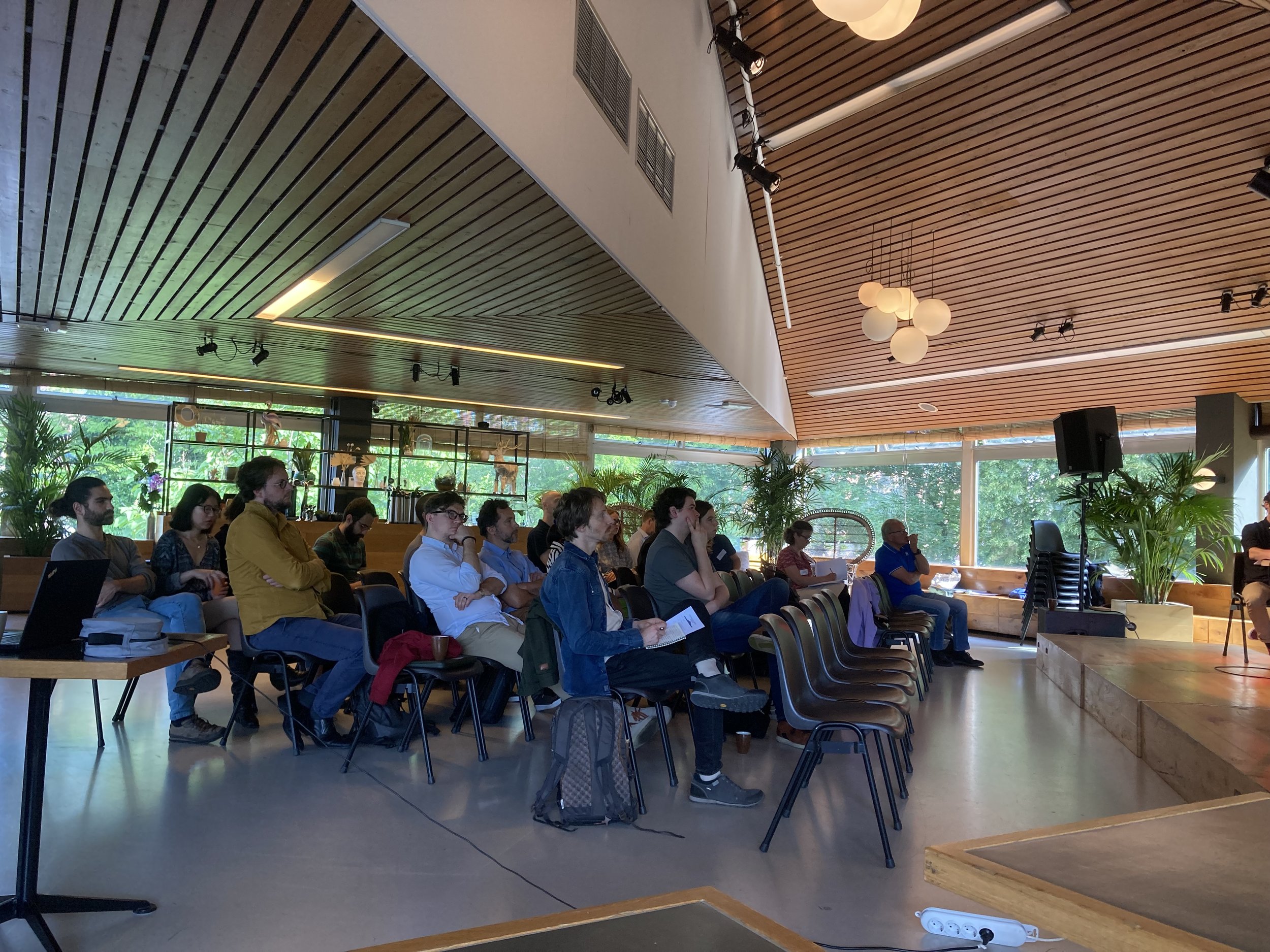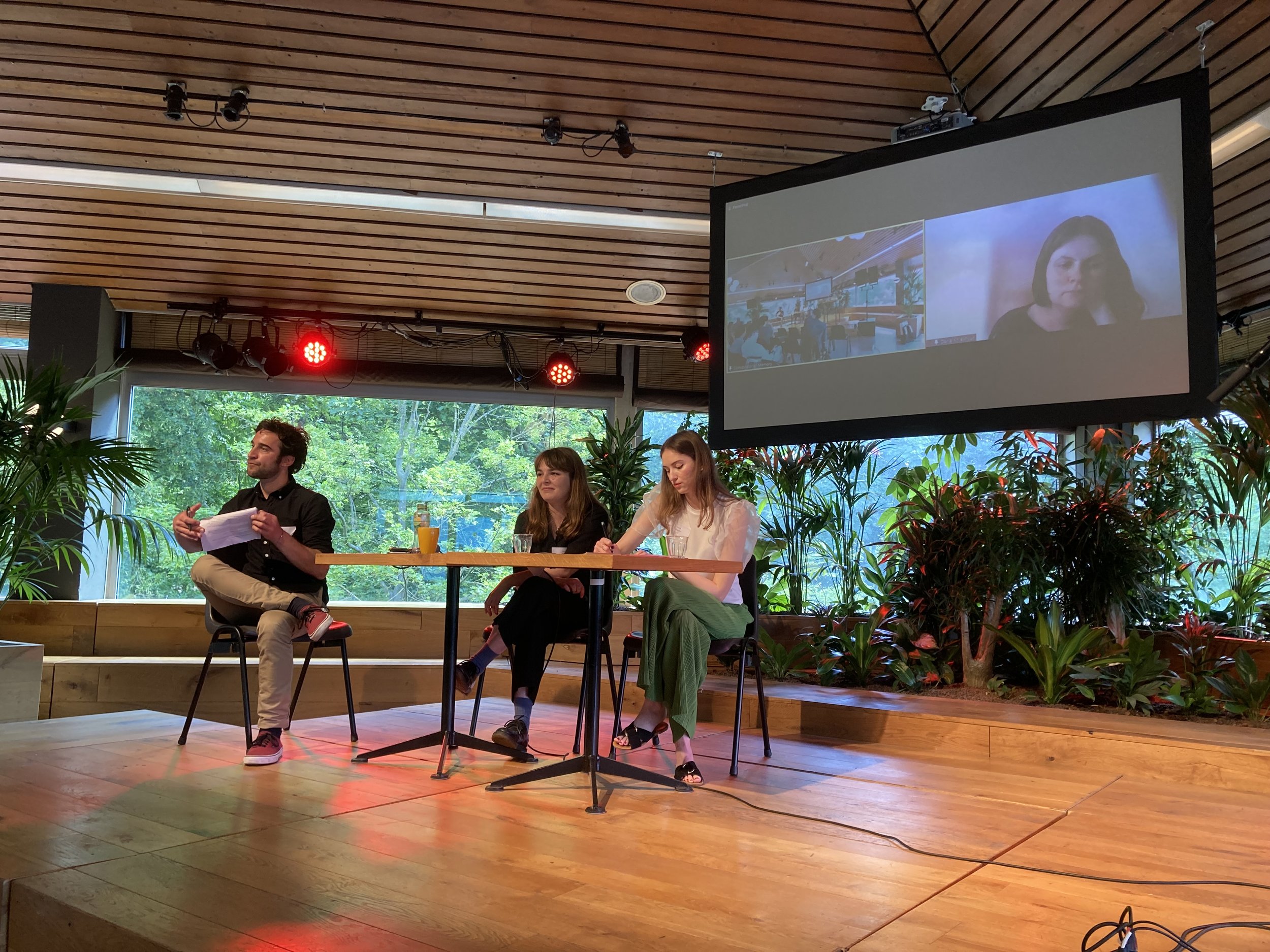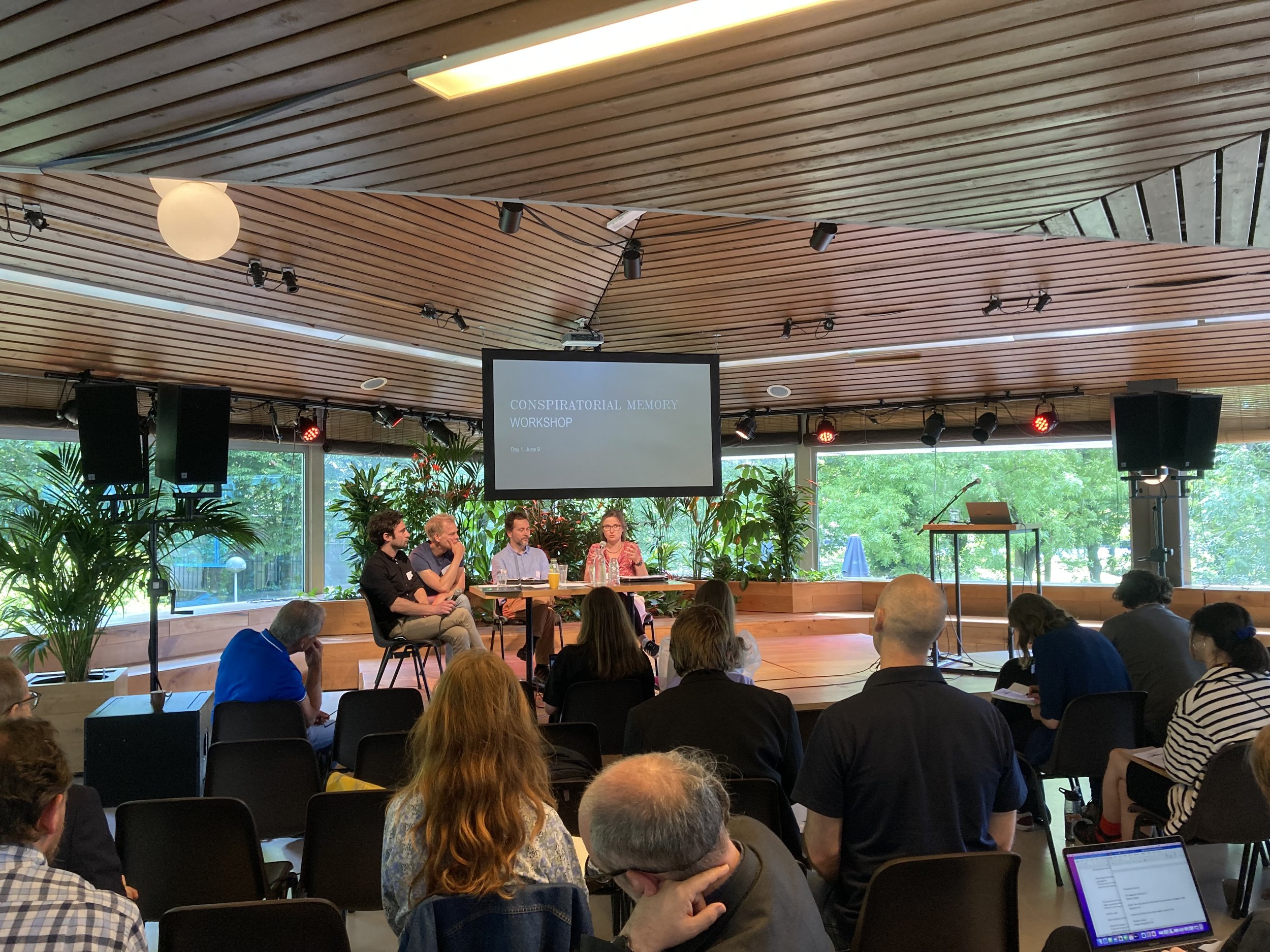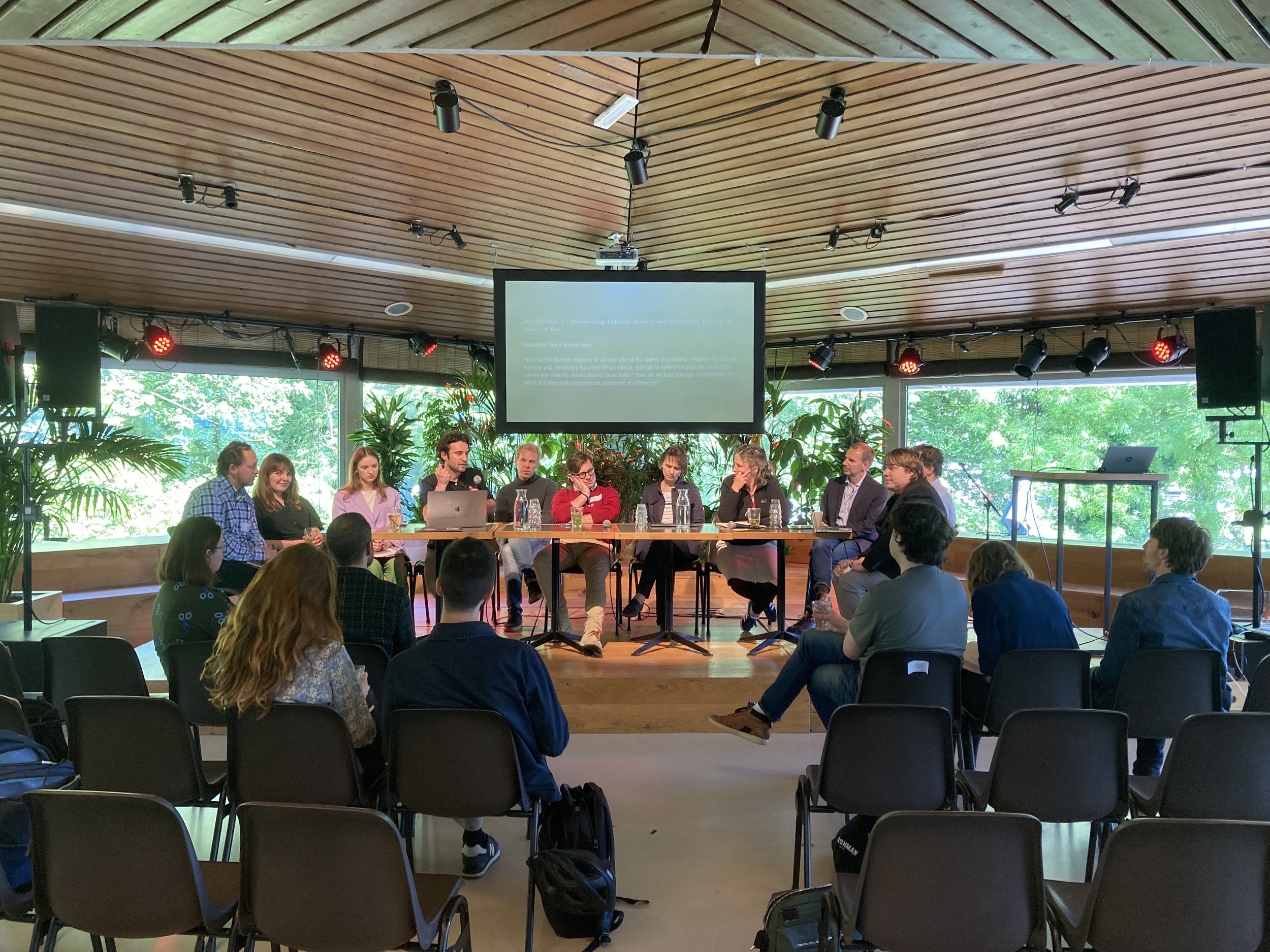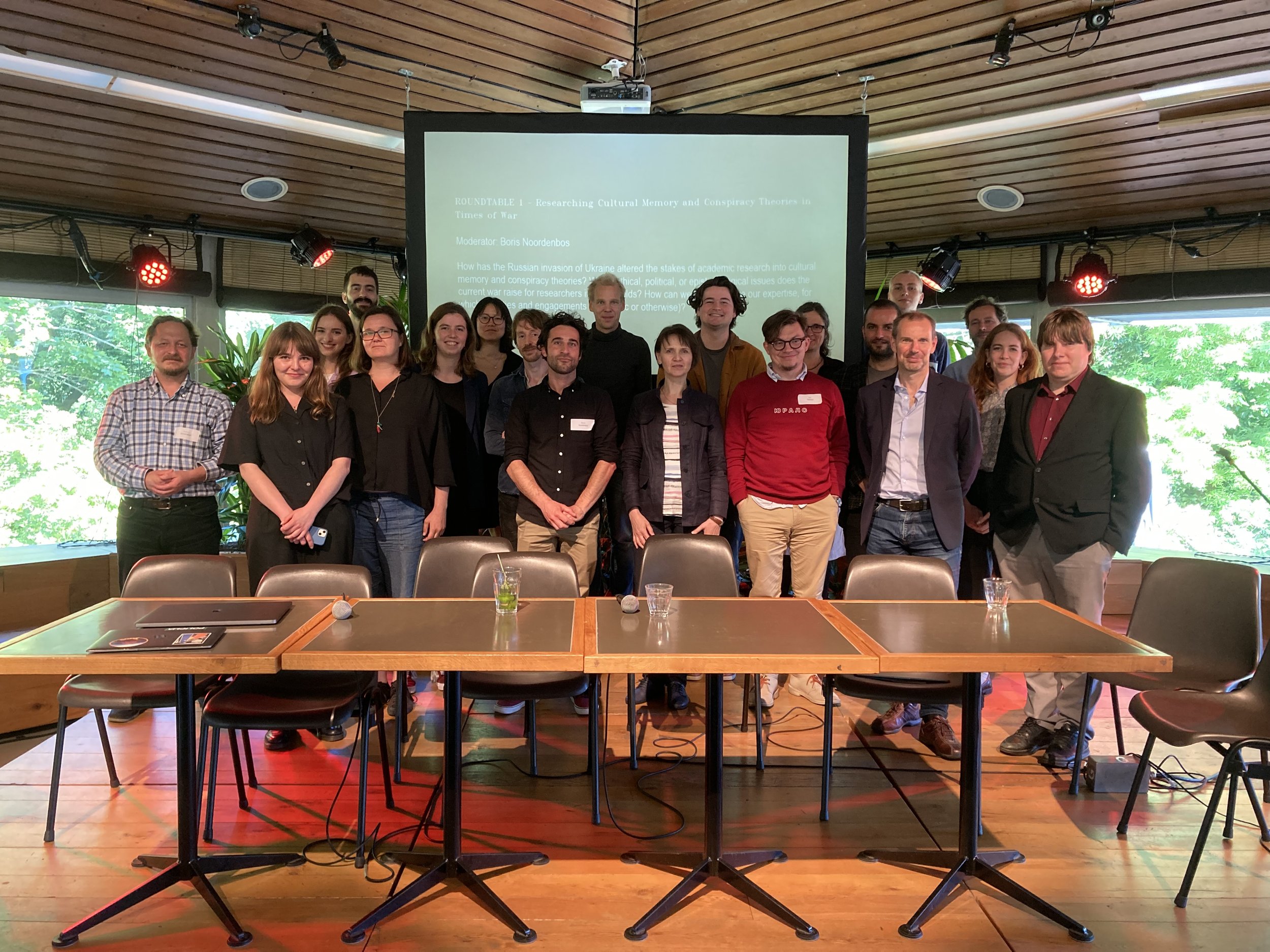14/07/2025 — 18/07/2025
Conspiratorial Memory project at the 9th Annual Meeting of the Memory Studies Association in Prague
The team held a roundtable “Conspiratorial Memory: A Practice and a Concept” on July 15th. The panel included paper presentations related to the upcoming edited volume by the project:
Daria Khlevniuk. “Memories and Conspiracies: The Past-Present Orientation”;
GN. ‘“This is what they did to Diana”: memory as a driving force of conspiratorial imagination illustrated by the Kate Middleton conspiracies"';
Maria Plichta. “Dispatches from “cursed land”: Conspiratorial memory of the Smolensk disaster”;
Boris Noordenbos. “Spectacles of Invisibility: Visual Culture, Conspiratorial Memory, and Russian State Media Reporting on the War Against Ukraine”;
Tatjana Menise & Mari-Liis Madisson. “Destruction of Russian Cultural Memory as Part of the Malicious Plot: Mankurtization of the Baltics”.
19/06/2025 — 20/06/2025
Boris Noordenbos co-organizes “Common Resentments, Diverging Plots: Forms and Functions of Popular Conspiracy Culture in Eastern Europe” workshop in Berlin.
The workshop focused on the interplay of conspiracism, popular culture and resentment in Easter Europe. Full report (in German) can be found here.
Conspiratorial Memory project organises 3rd PoSoCoMeS conference in Yerevan, 2026
On January 22-24, 2026, the 3rd PoSoCoMeS conference will be organised in cooperation with the project Conspiratorial Memory and the Yerevan State University. The Post-Socialist and Comparative Memory Studies (PoSoCoMeS) working group is part of the Memory Studies Association. We aim to bring together researchers, activists, and practitioners working in and on post-socialist countries. We call for regional as well as trans-regional comparative studies that connect Eastern Europe and Africa, Latin America, and Asia, and result in broad conceptualisations of post-socialist memories.
The topic of the conference is Post-Socialist Memory in Times of Crises and Speculation.
Submit your proposals by 15 May 2025 via the submission form or send to posocomes@gmail.com. More information and the call for papers can be found at https://www.posocomesyerevan2026.com
A blog post featured in the “(Mis)Translating Deceit: Disinformation as a Translingual, Discursive Dynamic” project
You can read the post “Where does the past end and the present begin? The temporalities of propaganda in the Russian war on Ukraine" written by Daria Khlevniuk, GN and Boris Noordenbos here.
18/07/2024 — 20/07/2024
Conspiratorial Memory team at the PoSoCoMeS Conference in Lima
On July 18—20 a conference “Memories in Transit” by an Association for Memory Studies was held at Pontificia Universidad Católica del Perú in Lima, Peru. The focus of the conference was on transmission of memory amidst various societal contexts and spaces and the intersection of this transmission with the frameworks of populism, authoritatrianism and violence.
The Conspirational Memory team presented and discussed several projects at the conference:
Anna Greszta: “Beautiful Faraway? Victory Day, Russo-Ukrainian War and Time-Traveling on TikTok”
Boris Noordenbos: “Spectacles of Invisibility: Conspiratorial Memory and the Russo-Ukrainian War”
Maria Plichta: “On “cursed land”: Mobilising memory and affect in narratives of suspicion around the Smoleńsk catastrophe”
25/09/2024 — 27/09/2024
Conspiratorial Memory team participates at the PACT project conference in Tallinn
On September 25–27 a conference “Populism, Conspiracy Theories and the War Against Ukraine” was held by the “PACT: Populism and Conspiracy Theory” project in Tallinn. One of the main focuses of the conference was on the role of conspiracy theories in the Russo-Ukranian war. The Conspirational Memory team presented and discussed several projects at the conference:
Anna Greszta: “‘Donbass’: Enemies in Disguise. Ambiguity, (Un)Masking and Maskirovka in the Russo-Ukrainian War”
Boris Noordenbos: “Spectacles of Invisibility: Conspiratorial Memory and the Russo-Ukrainian War”. Conference “Populism, Conspiracy Theories and the War Against Ukraine”
Daria Khlevniuk: “Conspiratorial Memory vs Conspiracy: Russian Nationalist Groups, Conspiracy Behind the USSR’s Demise, and the Russo-Ukrainian War”
Maria Plichta: “On ‘cursed land’: mobilising memory and affect in narratives of suspicion around the Smolensk catastrophe”
25/04/2024—27/04/2024
Conspiratorial Memory team organizes a workshop in Smolenice, Slovakia
From April 25th to April 27th Conspiratorial Memory project organised a workshop dedicated to exploring the concept of conspiratorial memory. The workshop was held in a beautiful Smolenice castle, near Bratislava, Slovakia. 14 presentations took place divided by 4 thematic panels: “Global Conspiracism”, “Imperialism as Conspiracy”, “Digital Conspiracy” and “Conspiracy Theories in Politics”. Full program and list of participants of the event can be found below:
Introduction to the workshop by Boris Noordenbos & Daria Khlevnyuk
Session 1. Global Conspiracism
Chair: Maria Plichta
Doğan Gürpınar – “The Fragmentation of Turkish Politics and the Fall of the Opposition as ‘Reasonable and Moderate Center’: The New Conspiratorialism of White Supremacy and Islamism”
Vasilis Alexiadis – “Apocalypse Desired: Prophecies and Ethnoreligious Imaginations in the Greek Orthodox Church”
Nebojša Blanuša – “Croatian Postmemory of the WWII, Conspiratorial Memory of Nasty 1990s, and a Sense of the Nation's Demise as Predictors of Belief in a Super-conspiracy Theory of Global Tyranny”
Vedran Jerbić – “Inheritance of Postmodernism in the Age of Post-Truth: A New Episode in the Narrative of the Crisis of Democracy”
Session 2. Imperialism as Conspiracy
Chair: Anna Greszta
Kinga Polynczuk-Alenius – “Russian Imperialism as a Conspiracy Theory of History in Polish Journalistic Production”
Wojciech Ufel – “Anti-communism as a distinctive element of post-socialist colonisation in Poland”
Mari-Liis Madisson & Tanya Menise – “Destruction of Russian Cultural Memory as Part of the Malicious Plot: The Case of the Mankurt Conspiracy Narratives in the Baltics”
Session 3. Digital Conspiracism
Chair: Boris Noordenbos
Maria Plichta – “Conspiratorial Narratives of the Smoleńsk Catastrophe in Digital Media”
Anna Greszta – “Nazis Everywhere! Suspicion and Conspiratorial Memory in Sergei Loznitsa’s Donbass”
Mykola Makhortykh – “Can AI Memory Be Conspiratorial? Auditing How Image-Generative AI Represents the history of Ukraine”
Peter Knight & Clare Birchall – “Eternal September: The Parapolitical Past, Conspiracist Classics, and the Role of the Internet”
Session 4. Conspiracy Theories in Politics
Chair: Daria Khlevnyuk
Anastasiya Astapova – “Academic and/or a Spy? The Case of Vyacheslav Morozov
Elżbieta Drazkiewicz – “Conspiratorial clutter: national memory and accusations of conspiracies in Polish politics”
G.N. – “A Morbid Conspiracy: Interpreting the News about Alexei Navalny’s Death”
The main goal of the workshop was not only to engage with the concept of conspiratorial memory but to critically assess its applicability in different (inter-)national contexts and possible theoretical limitations. Each presentation was followed by a discussion in order to provide feedback for every participant. The final goal of the workshop is to initiate a publication of an edited volume that would incorporate all the research that was done by the participants, while also presenting a foundation for future academic engagement with the concept of conspiratorial memory. Two last sessions of the workshop were dedicated to developing the potential structure of the volume.
24/03/2024
Boris Noordenbos presents at the “Exploring Melodrama: Perspectives on Post-Socialist Space” Conference in Tokyo
Boris Noordenbos presented his conference paper “The Melodramatic mode in post-socialist conspiracy culture” at the “Exploring Melodrama: Perspectives on Post-Socialist Space” conference at Hokkaido University, Sapporo, Japan.
24/02/2024
Anna Greszta presents her research and project Collect4Ukraine in a 24-hour art stream
Anna Greszta presented her PhD research and activist project, Collect4Ukraine, in a conversation with Geert Lovink, as part of a blurred-format, 24-hour art stream marking the second year of Russian aggression against Ukraine. The stream was organized thanks to the Institute for Networked Cultures (Amsterdam University of Applied Sciences) and the UKRAiNATV project supported by the Intermedia Department of the Academy of Fine Arts in Krakow, Poland.
06/12/23
Boris Noordebos and Daria Khlevnyuk present at the “Conspiratorial Memory in Russia” conference
Boris Noordenbos is going to give the presentation “Mutated Temporalities: The Conspiratorial Memory of the Chornobyl Nuclear Disaster”, while Daria Khlevnyuk will present “Coopting conspiracy: Conspiratorial memory of the USSR’s demise in pro-Soviet and nationalist online communities in Russia”. The event is hosted by The New School (NY, USA) on the 6th of December at 6:30 pm. Register here.
01/11/23
Anna Greszta gave a lecture on post-truth in Design Academy Eindhoven
On November 1, 2023, Anna Greszta gave a lecture to master's students of information design at Design Academy Eindhoven, focusing on post-truth, remediation, and practices of disguise in Sergei Loznitsa’s film 'Donbass.'
21/10/23—22/10/23
Daria Khlevnyuk participates at Memory Forum 2023
Memory Forum is a conference dedicated to history and heritage of Soviet mass repressions.
Histories at Risk workshop with Daria Khlevnyuk as a discussion panelist
The Histores at Risk workshop focuses on Russia. The event is to happen on the 22nd of November at 15:00. You can register here.
20/10/23
Anna Greszta gave a guest lecture at the University of Amsterdam
Anna Greszta gave a guest lecture about her PhD project to Slavistics students at the University of Amsterdam in the Cultural Trajectories course led by Eric Metz.
09/10/23
Anna Greszta was a panelist during the Amsterdam Polish Film Festival
This year, the Amsterdam Polish Film Festival focused on Central European history and current events, featuring films about communist history and discussions addressing the Russian war in Ukraine. Panelists, Anna Greszta, along with directors Maryna Er Gorbach ("Klonidke") and Elwira Niewiera ("The Hamlet Syndrome"), engaged in a detailed conversation about the impact of the war on people's lives. The festival was organized by the Polish Culture NL Foundation and co-produced in partnership with the debate center De Balie.
06/10/23
Anna Greszta gave a guest lecture at University of Amsterdam
Anna Greszta gave a guest lecture on “Conspiratorial Memory in Cultural Representations of the Russo-Ukrainian War" as part of Erica van der Sijpt's course, "Anthropology of Eastern Europe," at the Department of Anthropology, University of Amsterdam.
27/09/23—29/09/23
Boris Noordenbos and Daria Khlevnyuk at the “Achievements and Perspectives of Cultural and Social Memory Research” conference in Berlin
On the 28th of September Boris Noordenbos and Daria Khlevnyuk presented their paper “Disinformation as memory work: temporalities of propaganda” at the “Achievements and Perspectives of Cultural and Social Memory Research” conference at Technische Universität Berlin.
20/09/23 — 23/09/23
Conspiratorial Memory Team at the PoSoCoMeS Conference in Tallinn
On September 20–23 a conference “Post/Socialist Memory Cultures in Transition” was held by Tallinn University. Daria Khlevnyuk was a member of the organising and program committee. One of the main focuses of the conference was on the role of memory in the Russo-Ukranian war. The Conspirational Memory team presented and discussed several projects at the conference:
Daria Khlevnyuk and Boris Noordenbos: “Temporality Reconsidered: Historical References in Russian State Media Coverage of the Russo-Ukrainian War”
Anna Greszta: ““The Russian Military Disneyland”: Conspiratorial Memory in the Cathedral of the Russian Armed Forces”
Maria Plichta: “First As a Tragedy, Then As “the Cringiest Film About an Important Subject”: Katyń, Smoleńsk, and the Transmission of Memory”
Here are the first-hand experiences of this conference from the team:
“I had a very thought-provoking time at the PoSoCoMeS conference. Not only did it bring together outstanding professionals in the field of memory studies (allowing us to reconnect with old friends and make new ones), but it also effectively incorporated a strong decolonial perspective and highlighted the ongoing Russo-Ukrainian war as a central topic of many discussions. I'm particularly grateful for the organization of the panel titled "Ukrainian Heritage at War: Vulnerability and Resilience of National Identity." Many thanks to the speakers, Kateryna Goncharova, Valentyna Kharkun, Milena Chorna, and Svitlana Shlipchenko, all of whom are affiliated with Ukrainian institutions, for their valuable contributions, knowledge sharing and presence (online and offline) during the panel” – Anna Greszta
“Apart from the many excellent panels, the conference comprised five keynote lectures. Not only was each of them exceptionally powerful in itself, they also complemented one another beautifully, showcasing the thematic breadth and relevance of contemporary Post-Socialist Memory Studies" – Boris Noordenbos
“The 2nd PoSoCoMeS Tallinn went very well, in my biased organizers' opinion. We heard some very stimulating keynotes on the state of the field in Eastern European memories. The panel presentations were thought-provoking and included reports from colleagues on innovative research. Several panels and roundtables dealt with the implications of the Russo-Ukrainian war on memory studies, both theoretically and practically (including heritage reconstruction or museum artifacts preservation in the occupied territories). Boris and I gave a talk on our joint paper about the temporal structures of Russian propaganda and the temporalities of the memory work it does. We got helpful feedback and will incorporate the comments in our future work” – Daria Khlevnyuk
“I greatly enjoyed the conference and felt both honoured and a little intimidated to present my work in such impressive company. I took lots of inspiration from the various presentations and keynotes, such as Joanna Wawrzyniak’s gripping lecture on alternative ways of understanding the memory of the 90s in post-socialist contexts. Also, I greatly enjoyed the chance to spend time in Tallinn again (encountering my favourite food delivery robots was a particular highlight)” – Maria Plichta
Boris Noordenbos’ interview for Der Standard about the new forms of Russian cyber propaganda (in German)
An Austrian news portal Der Standard has asked Boris Noordenbos to provide a detailed account of how Russian online propaganda works in the midst of the Russian invasion of Ukraine.
The interview is available via this link.
Boris Noordenbos’ article on Aleksandr Dugin published in NRC (in Dutch)
A Dutch newspaper NRC has published an article by Boris Noordenbos. In it, he discusses two recent books by Victor Kal and Michael Millerman that in their analysis attempt to take seriously the philosophy of Aleksandr Dugin, who is considered the spiritual father of Putin’s geopolitics.
The article is available via this following link.
Conspiratorial Memory team presents at Eastplaners #6
On June 28, cultural anthropologist Anna Greszta and cultural and media theorist Maria Plichta presented and discussed their work in one of the events in the Eastplainers series. The leader of the Conspiratorial Memory team Boris Noordenbos moderated the session. Professor of Slavic literatures Ellen Rutten opened the meeting with a short introduction into the Eastsplainers series as a whole.
Public lecture series by the Department of Slavic Languages & Cultures (University of Amsterdam), in cooperation with the University of New Europe, with artists and intellectuals who recently migrated or fled from Central & Eastern Europe to the Netherlands.
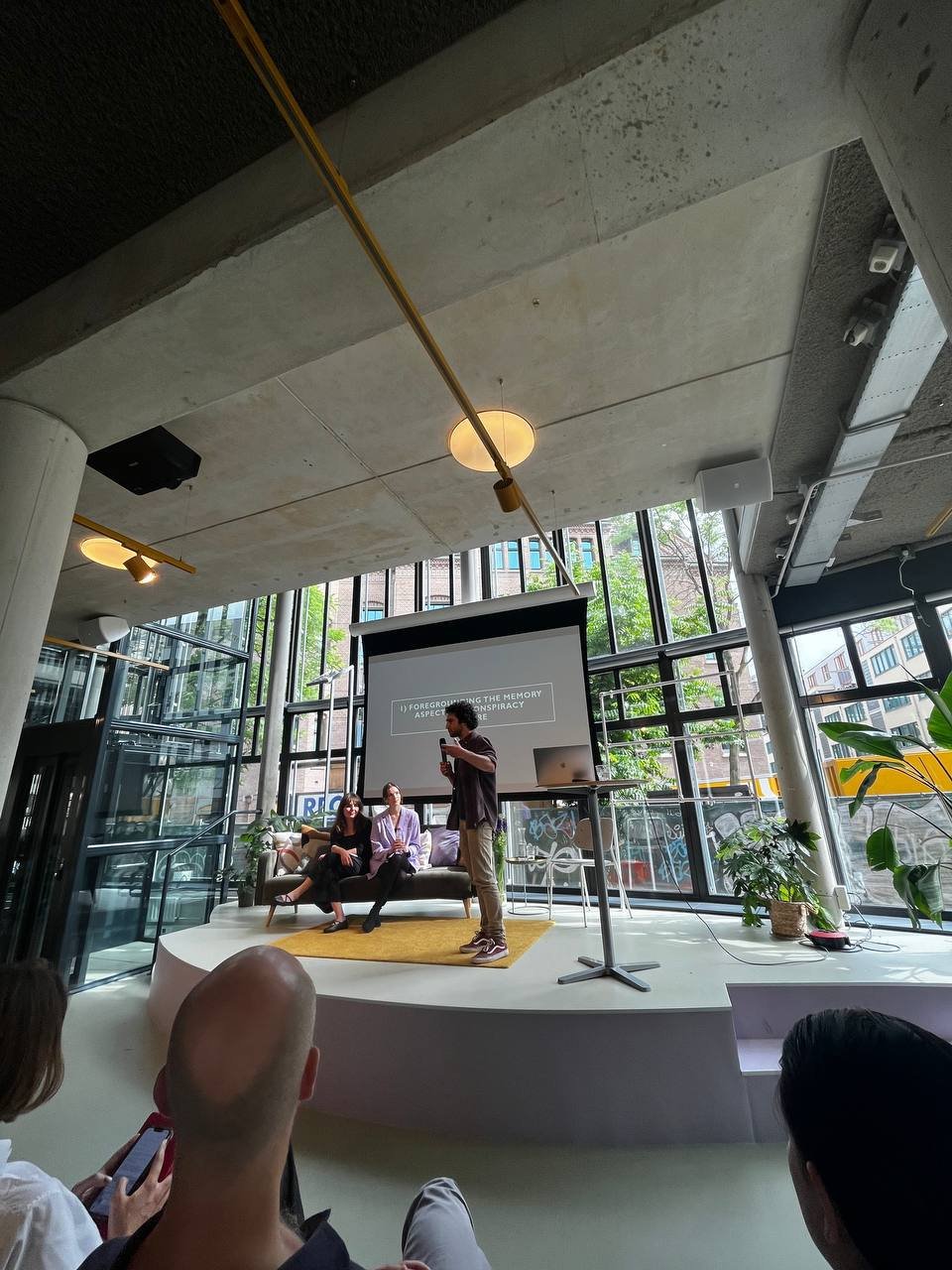
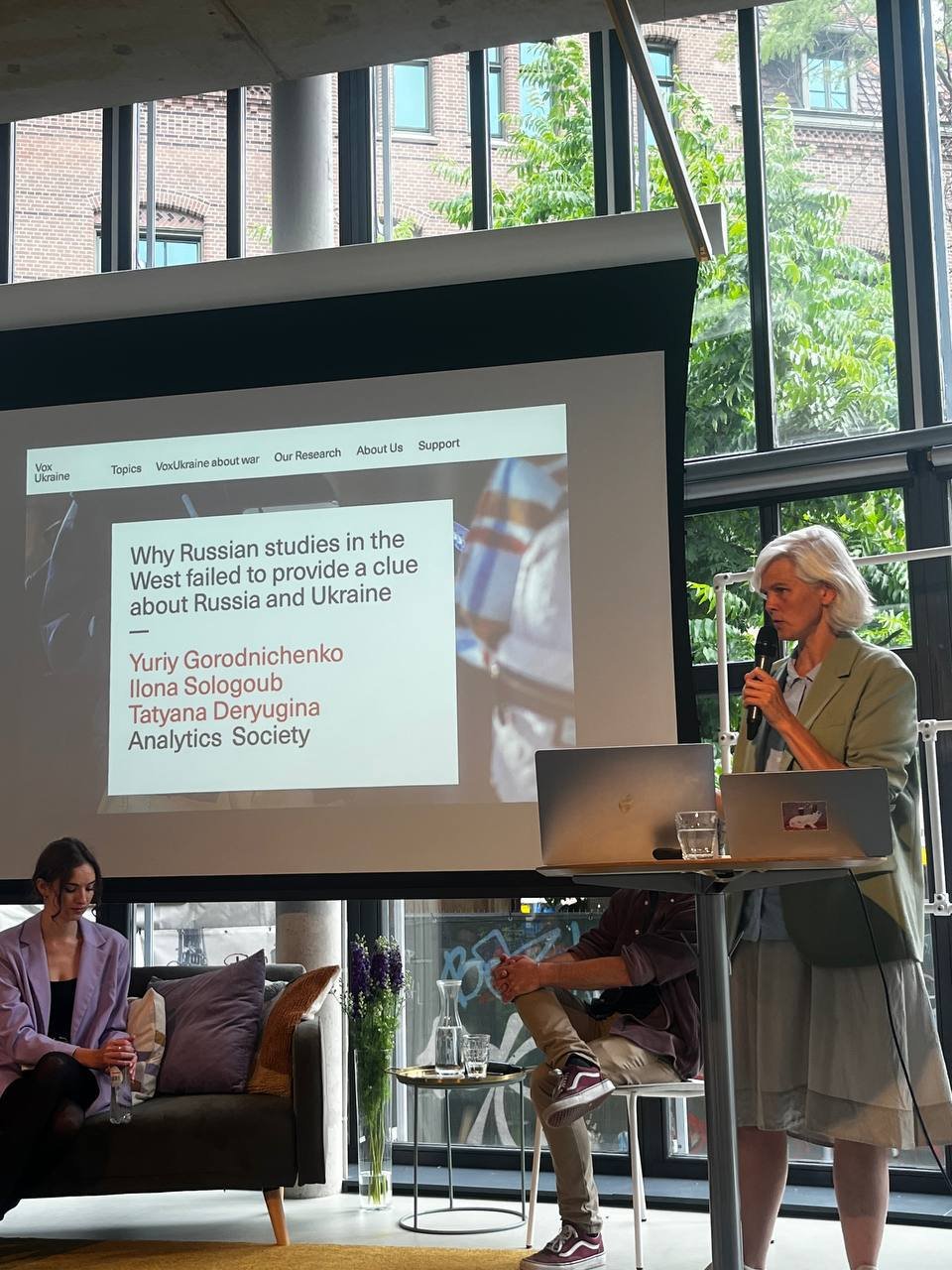
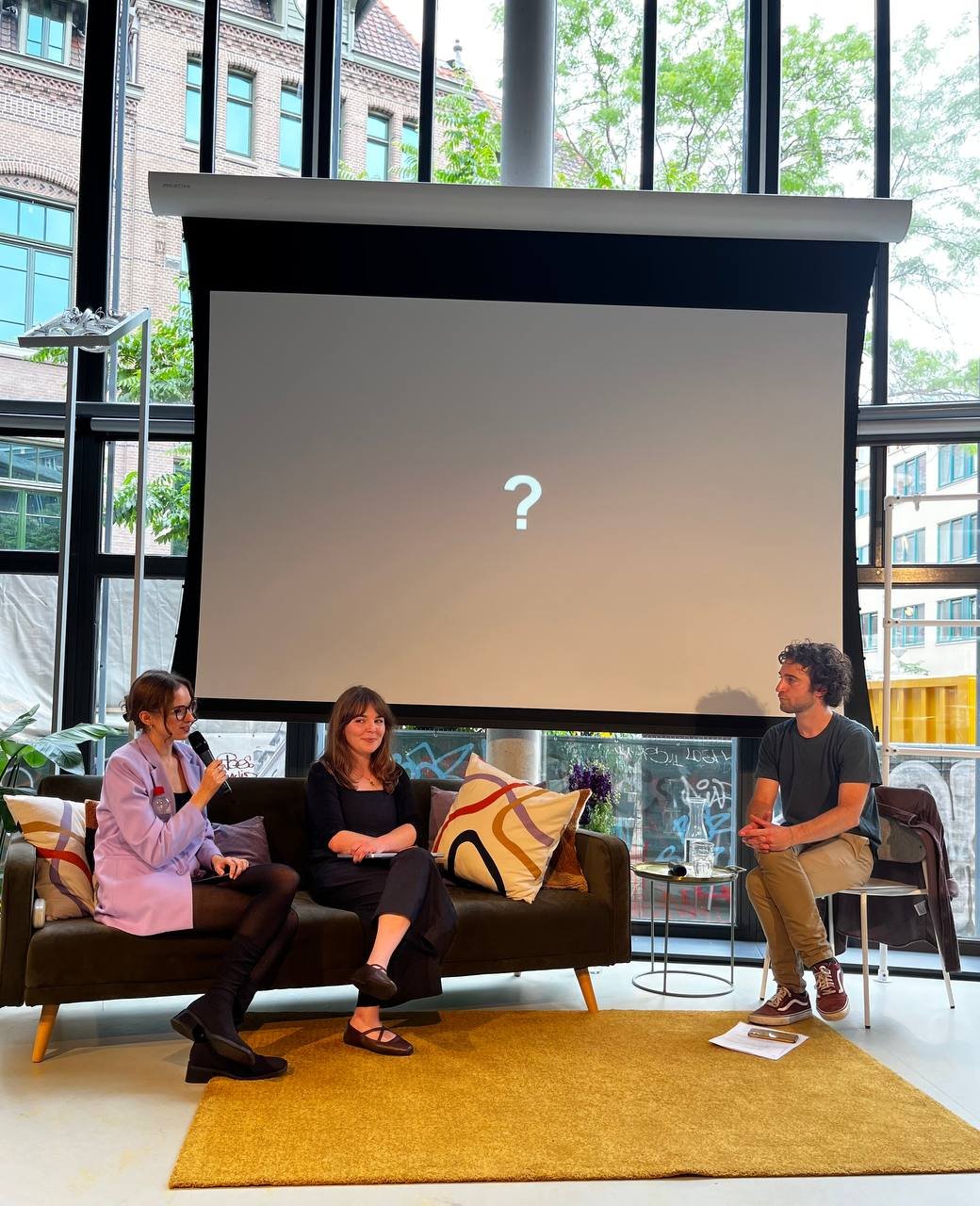
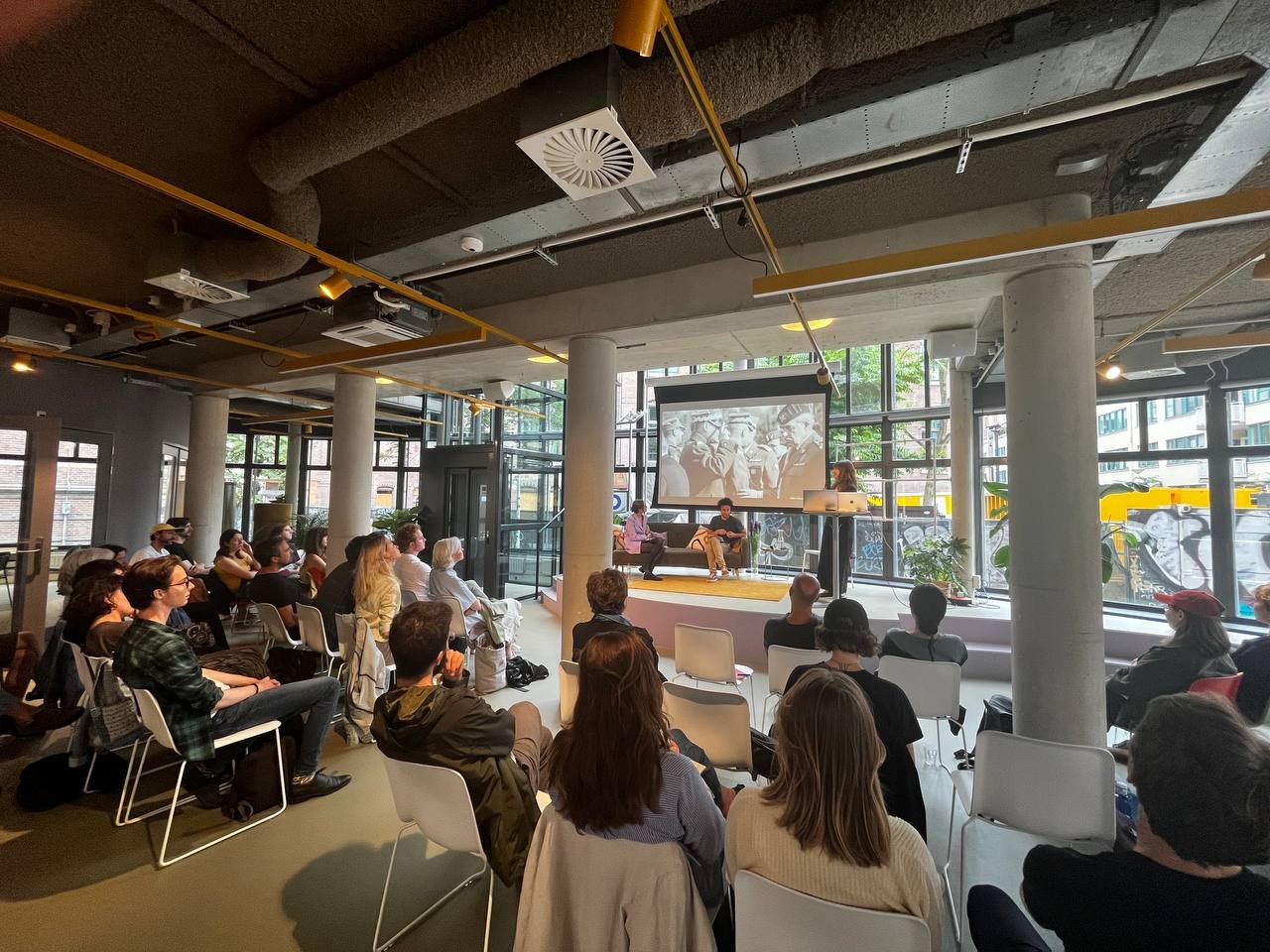
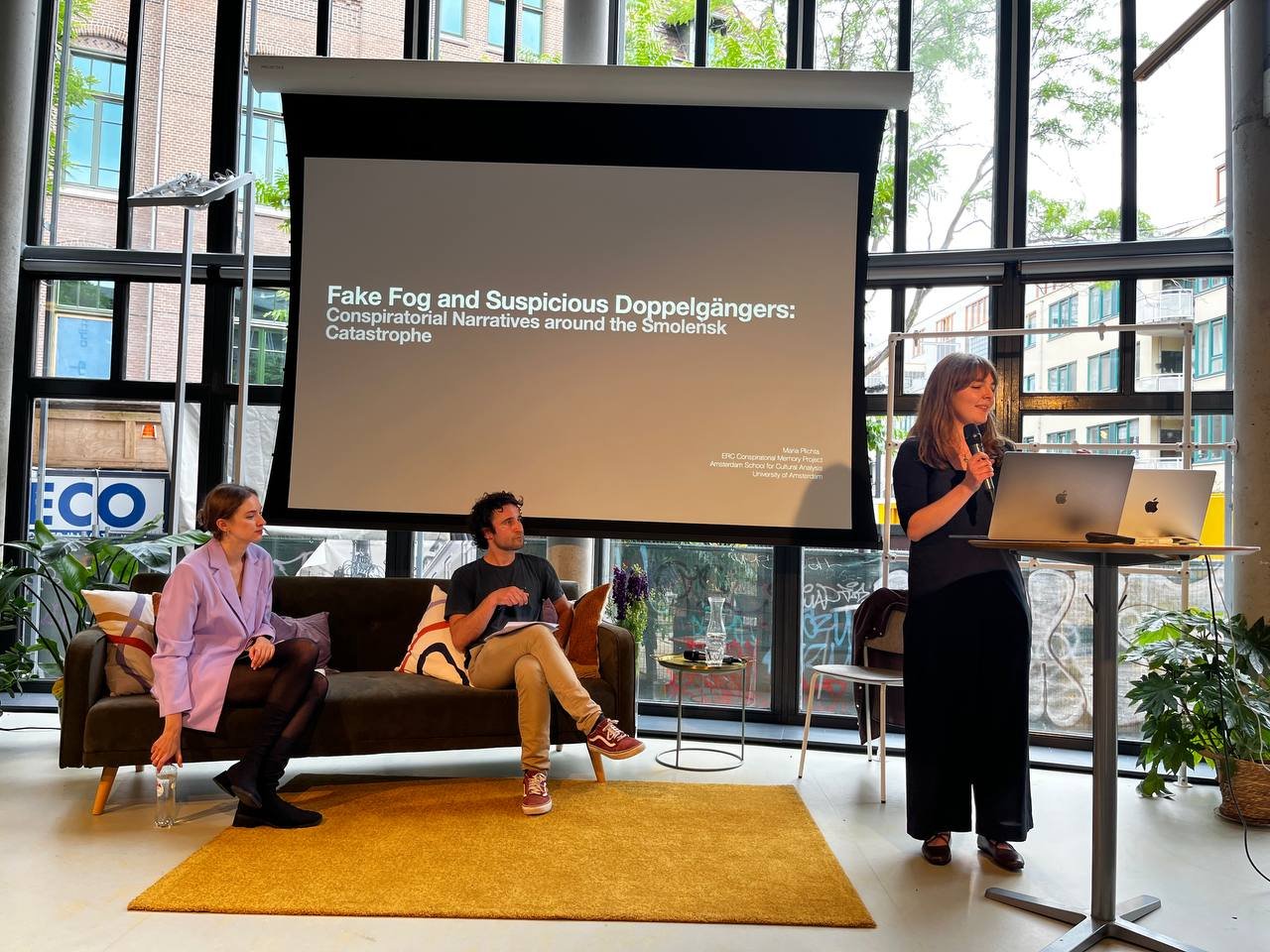
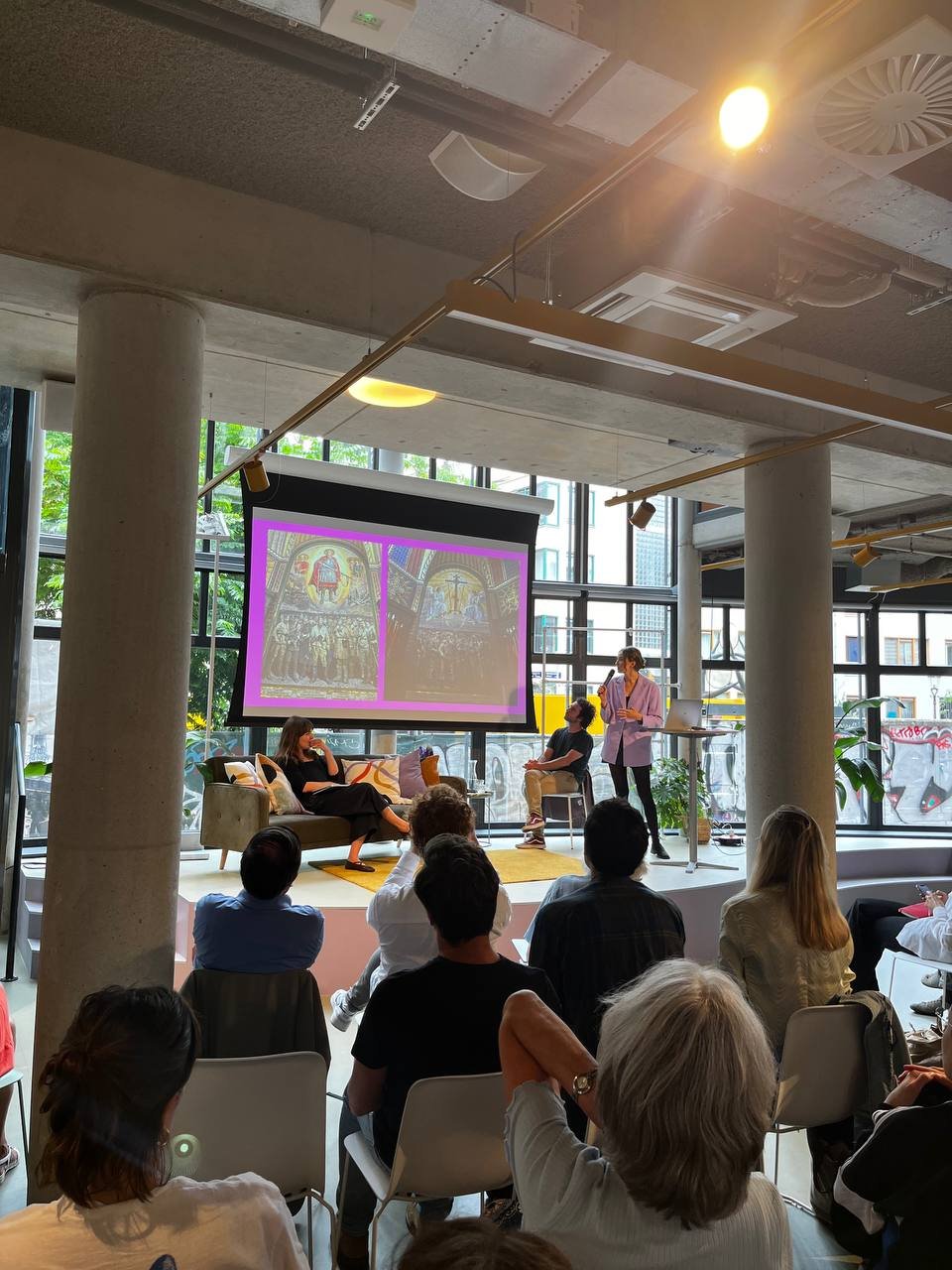
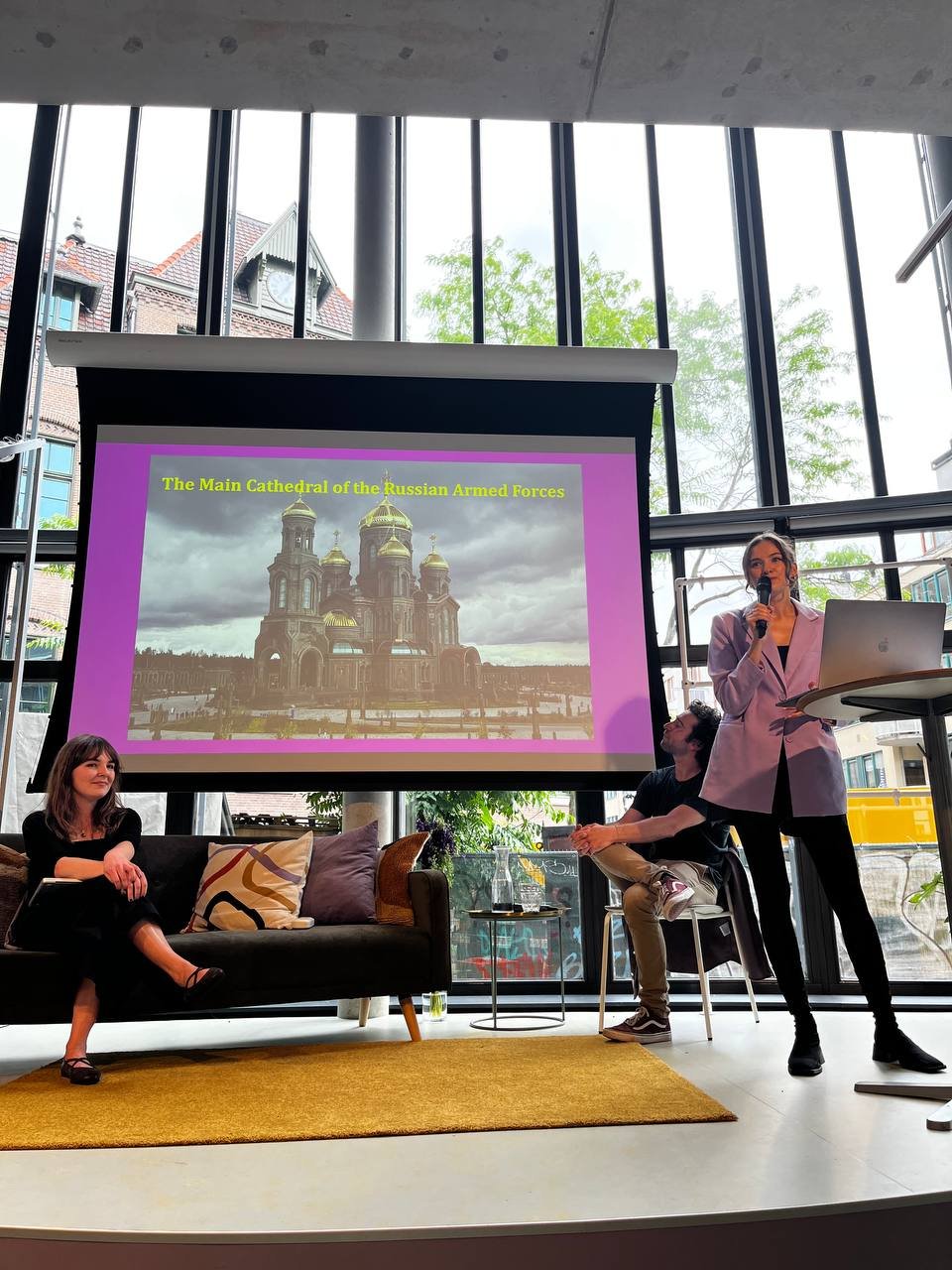
Conspiratorial Memory team to present at Eastsplainers #6: Media & Memory
Public lecture series by the Department of Slavic Languages & Cultures (University of Amsterdam), in cooperation with the University of New Europe, with artists and intellectuals who recently migrated or fled from Central & Eastern Europe to the Netherlands.
Date: June 28, 2023
Time: 17.oo-18.30
Location: VOX-POP
Registration: here
As the Russian war in Ukraine and imperialist Kremlin rhetoric continue to disturb world media, Eastsplainers offers a counterweight to westsplaining – the habit of looking at developments in Central & Eastern Europe through Western lenses. In this public program series, we listen to scholars, journalists, artists, musicians, and other cultural and academic professionals who migrated or fled from Kyiv, Łódź, Minsk, and Moscow, among other places, to the Netherlands. Rather than amplifying views on various Central & Eastern European locations as a monolithic European ‘East,’ our programs show that these locations merit independent study and careful attention to local dynamics.
On June 28, cultural anthropologist Anna Greszta and cultural and media theorist Maria Plichta will discuss how conspiracy theories tap into stories about the past. Focusing on different East European contexts, all of which are heavily impacted by the Russian war in Ukraine, they discuss the role of culture (online and offline, fiction and non-fiction) in imagining past and present plots against “our” community. Cultural and literary theorist – and leader of the Conspiratorial Memory research team – Boris Noordenbos moderates the session. Professor of Slavic literatures Ellen Rutten opens the meeting with a short introduction into the Eastsplainers series as a whole.
NB. This event will be accompanied by a fundraising market organized by Collect4Ukraine, Amsterdam-based grassroots initiative that aims to support people and animals who suffer due to Russian aggression.
For information about the other sessions, please visit the Eastsplainers webpage. The series is set up with support from the University of New Europe, Middle- and Eastern-European studies publisher Pegasus, the Amsterdam School for Cultural Analysis and the diversity & inclusion team of the UvA's Faculty of Humanities.
Anna Greszta to give a lecture on memory, conspiracy and coloniality in the Main Cathedral of the Russian armed forces at H401
On Tuesday, May 23 at 17.00 Anna Greszta will give a lecture titled: (Dis)entanglements of Memory, Conspiracy and Coloniality in the Main Cathedral of the Russian Armed Forces. The lecture is a part of SPEME – Questioning Traumatic Heritage: Spaces of Memory, a project hosted by H401. More information is available here.
If you wish to participate, please send an email to Micol Manunta (m.manunta@h401.org).
On Cultural Analysis in the Study of Local Contexts - Boris Noordenbos in conversation with Ernst van Alphen
Two theorists and practitioners of Cultural Analysis – both situated outside the field of Modern Greek studies – talked to Greek Studies Now Cultural Analysis Network about the practice of Cultural Analysis in their own work and its relevance and implications for the study of local (and national) contexts. This discussion took place during a panel at the 2nd ‘Greek Studies Now’ conference in Amsterdam in 2022. The reflections epitomise some of the main insights of both discussants.
Events recommendations. 1 year since the start of the full-scale Russian military invasion of Ukraine
As the 1 year anniversary of the full-scale Russian military invasion of Ukraine is approaching, our team has put together a few event recommendations in the Netherlands that will mark the date.
Solidarity & Benefit Concert for Ukraine
Date: February 24, 2023
Time: 20.00
Location: Aula Lutherse Kerk, Singel 411, Amsterdam
For more information follow this link.
The evening is organised by the University of Amsterdam, Davidsbündler Music Academy, University of New Europe and the Ukrainian Embassy of the Netherlands, with the support of TRIDA Foundation, the Amsterdam University Fund and Alumni Association AUV. The benefit concert will feature various Ukrainian musicians, including the SonCe Trio, percussionist Konstantyn Napolov, singer Maryana Golovchenko and young students from the Davidsbündler Music Academy
By purchasing a ticket for this concert, you support Ukrainian people in Ukraine and the Netherlands. Most of the proceeds (75%) of the concert will go to UNITED24 to purchase food, medicine, and essential items that will be sent to Ukraine. The remaining 25% will be used to grant scholarships to talented Ukrainian children who had to flee their country together with their mothers and now continue their music education at the Davidsbündler Music Academy in The Hague. Several young talented Ukrainian musicians will perform at the benefit concert as well.
Kourliandski, Kurbatov, Desyatnikov in 'Who am I?'
Date: February 25, 2023
Time: 17.00 - 22.00
Location: Waalse Kerk, The Hague
For more information follow this link.
Stichting “Music for Peace” in collaboration with FreeRussiaNL and LetterenFonds present “Who am I?” The cultural event will try to answer such questions as “How it became possible what is going on in Ukraine now? Why do Russians behave like that? Why could Russians do nothing about Putin? Do all the Russians agree and think alike? What is their type of thinking?” It will feature expert talks, a video exhibition, a conceptual art performance, and a concert.
“Brave suffering - on heroism and trauma.” Anna Greszta invited to a talk during a mini-festival “Ukraine: Culture for Hope” at Lab-1, Eindhoven
As part of the cultural mini-festival and an introduction to a screening of Valentyn Vasyanovych’s film Atlantis (2019), Anna Greszta was interviewed by a Polish poetess Aldona Kopkiewicz about the role of affect, memory and trauma in cultural representations of the Russian war against Ukraine.
Boris Noordenbos to lead a seminar Weaponizing the Past: The Conspiratorial Memory Work of Putinist Propaganda at Utrecht University (January 18, 2023)
Date: January 18, 2023
Time: 17.15
Location: Utrecht University, Drift 21, GA 0032
For more information follow this link.
In the context of the current war, commentators frequently point to the Kremlin’s ludicrous vilifications of Ukrainians, as brutal ‘fascists,’ rabid ‘nationalists,’ dangerous ‘Bandera-supports,’ or marionetted ‘instruments’ of the ‘Russophobic’ West. The conspiracism and anachronism of this rhetoric is widely acknowledged. Yet the mechanisms by which Putinist propaganda weaponizes ‘the past’ leave many questions open. How exactly do tropes of memory and conspiracy reinforce one another in the Russian leadership’s propagandistic justifications for their unprovoked war against Ukraine? What are the (Soviet and post-Soviet) genealogies of these tropes, and how do official and grassroots voices (selectively) recycle them as interpretive lenses onto current affairs? What kind of relations between past, present, and future are imagined in the process?
Exploring these questions, the lecture proposes the concept of ‘conspiratorial memory’ for this toxic mix of mnemonic gestures and conspiracy-based interpretations. Extending its scope beyond the recent invasion of Ukraine, the paper also zeroes in on the 2014 annexation of Crimea, and the Covid-19 crisis of 2020-2022. It scrutinizes how conspiratorial memory informed state-aligned perspectives on these events, as expressed in journalism, popular culture, and political rhetoric. Finally, the lecture addresses the value and limitations of memory studies’ conceptual toolkit. How may recent scholarship in this ever-expanding field help to elucidate – and inspire strategies to counter – the rhetorical and affective appeal of conspiratorial memory?
Boris Noordenbos to participate in Creative Culture Talk (December 12, 2022; in Dutch)
Date: December 12, 2022
Time: 20.00
Location: LUX 7, Nijmegen
For more information and tickets follow this link.
This Creative Culture Talk explores the narrative aspects of contemporary conspiracy theories. With scientists and creators, it investigates which characters, plot lines, motives and metaphors are central to radical political (online) discourses. What are the stories conspiracy theorists tell about themselves and the world, and where do they come from? Who are the bad guys, the good guys, the side characters, the extras? How can artists teach us to understand such stories?
Boris Noordenbos will make appearance together with theater makers Eva Line de Boer and Booi Kluiving, both of whom made performances about the radical aspects of online culture. In KEK, Booi explores the frayed edges of the right-wing internet subculture through his alter ego Anon. Eva Line's Infinity Chan is inspired by the story of Fredrick Brennan, the founder of the forum 8Chan, where racist, sexist and anti-Semitic messages are posted uncensored.
Image: LUX Nijmegen.
Memory Studies Association Memory Scholars at Risk Fellow to join the project
From the beginning of the Russian aggression against Ukraine in 2014, and especially with the beginning of the massive military invasion on 24 February 2022, this MSA Fellow from Russia used his Facebook account as a platform for anti-war discussion and published a declaration against the war in Ukraine. For his activism, he has been persecuted by the FSB, which forced him to abandon Russia and seek refuge elsewhere. After a period in Uzbekistan, the professor and researcher who worked at the Perm branch of the Higher School of Economics had moved Germany, where was accommodated at the Universities in Bremen and Mainz.
From mid-December on, he will continue his research at the Amsterdam School for Cultural Analysis thanks to the MSA Fellowship “Memory Scholars at Risk”. Together with the PI Boris Noordenbos and the rest of the Conspiratorial Memory team, he will continue to analyze memory-related news stories and opinion pieces about the current war against Ukraine.
We share an excerpt of his story. The full text can be found here. For reasons of his personal safety, his story has been anonymized.
February, 23
I work in my country household (“dacha”), dropping wet, heavy snow from the roof of the house. Incoming letter from my German colleague: “Hooray! Our project, ‘Remembrance of Solidarity as a Resource in the Current Conflict Situation,’ is supported by the German foundation!”
We are working! I have a feeling that everything will be fine and that the war will not start». That’s great news. For several years we have been preparing this Belarusian-German-Russian-Ukrainian project, dedicated to the memory of Jews from the western regions of the USSR who came (being evacuated, deported, exiled, fleeing) in the Urals during the Second World War. Evening, I read the news. The feeling grows more and more anxious. I am preparing a draft anti-war statement on behalf of the board of the regional branch of the Memorial Society and sending it to my colleagues.
Early in the morning — a shock, Putin’s crazy speech, the invasion begins. I write to my Ukrainian friends… God, this is madness. We discuss with colleagues from the Perm Memorial the text of the anti-war statement — this time against the actual, not the possible invasion, make some changes and publish it on our website.
Anna Greszta gave a series of lectures
Anna Greszta gave a series of lectures at Gerrit Rietveld Academie (Amsterdam) and in Plant Fictions gallery (Eindhoven), during the Dutch Design Week. Together with Ukrainian artist Yulia Krivich, they addressed the issues of (de)colonizing practices in Western academia and art initiatives, and critically revised the Western knowledge production about the Russian war against Ukraine.
Cultures of Conspiracy Interdisciplinary Course at the University of Amsterdam
The PI Boris Noordenbos will coordinate Cultures of Conspiracy course as an elective offered by the Institute for Interdisciplinary Studies (UvA) in the second semester of 2022-2023 academic year. The course is based on the winning proposal of Leonie von Platen (PPLE) for the UvA Create a Course challenge. It is open to second-year and third-year UvA Bachelor's students and Master’s students (when available).
Description:
In a world overflowing with suspicion, traditional anchors of knowledge (scientists, politicians, mainstream media) are no longer taken for granted. How do we differentiate between healthy skepticism and dangerous paranoia?
In this course, we take a curiosity-driven approach to understanding conspiracy theories. How do we define and delineate them? What is their rhetorical and emotional appeal? And what are their real-life repercussions? We explore to what extent current conspiracy cultures are historically unique and investigate the complex interdependencies between their social, psychological, and political dimensions. Which individuals and groups are susceptible to conspiracy thinking and how is their suspicion co-opted for (populist) politics in different national contexts?
We also look at cultural and technological mediation, as conspiracy theories now typically come to us through social media. Does online communication amplify and accelerate (global) conspiracy thinking, or does it merely render the conspiratorial worldview more visible? Can we distinguish new, tech-enabled variations from its offline predecessors?
Discussing these and other questions with experts from various fields, we explore new, interdisciplinary understandings of conspiracy theories and ways to respond to them.
Images from Conspiratorial Memory workshop
Conspiratorial Memory workshop took place in Amsterdam on June 9-10, 2022.
Boris Noordenbos will be part of an expert panel discussion at SPUI25
How New Media Reshape Traditional News Agencies and Politics: Fake News, Lügenpresse, and Disinformation Campaigns in the US, Germany and Russia
With the coming of age of digital media, the social debates on the importance of fake news, media hoaxes and disinformation came into focus of analysts, scholars and politicians. Interestingly, this global phenomenon has had similar features while developing within various local contexts. Particularly the US, Germany and Russia are of interest, since fake news has risen in different social contexts and the concept has different meanings in these countries. The experts Hanco Jürgens, Katy Hull and Boris Noordenbos will discuss the global influence of the new media on both traditional news-gathering and politics.
Anna Greszta and Maria Plichta take part in Eastern European Memory Studies Summer School
Anna Greszta and Maria Plichta gave presentations at Translating Memories in Literature, Film, Museums, and Monuments: An Eastern European Memory Studies Summer School on July 11-15, 2022 (Tallin University, Roosta, Estonia).
Anna’s presentation “Memory, History and Conspiracy in Russo-Ukrainian War” was part of the Memories of Socialist Past panel.
Maria took part in the Texts, Practices, Identities panel with the presentation “Fake Fog and Suspicious Doppelgängers: Conspiratorial Narratives around the Smoleńsk Catastrophe.”
Boris Noordenbos appears on BNR’s Big Five radio show (in Dutch)
Russia's propaganda machine is working overtime and the tone in TV shows is getting fiercer. What is the ideology behind that? Boris Noordenbos discusses this and other questions with the host.
Workshop registration deadline extended
The new registration deadline for the Conspiratorial Memory Workshop is June 5th. To register please send an email with your name and affiliation to conspiratorialmemory@gmail.com.
Conspiratorial Memory workshop program
The program of the two-day workshop “Conspiratorial Memory,” which will take place in Amsterdam on June 9-10th, 2022, is out and can be found here.
Boris Noordenbos appears as a guest on BNR De Wereld (in Dutch)
The project leader Boris Noordenbos appears in De Wereld programme at radio BNR (hosted by Bernard Hammelburg). The audio recording of the whole episode can be found here (min. 27 onwards). A shorter video clip from the same interview is below.










